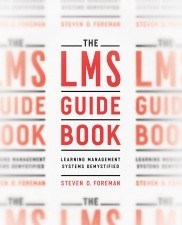Exploring Your Learning Managment System Niche
A web search on Learning Management Systems (LMS) will probably yield hundreds of products. Some deliver self-paced programs, others manage scheduled events, and many do both. Of course, a lot of systems offer extras like authoring tools, eCommerce, social interaction, badging and gamification, and so on. None of this is news to most people who work with an LMS.

However, what may be surprising is the fact that there are many specialized LMS products designed to meet the needs of a particular industry or professional area. Customers using these LMS niche products have access to standard LMS features plus a complement of value added features designed just for them.
Following are 10 vertical markets served by niche LMS products.
1. Aviation Workers
Civilian and military services that respond to airport accidents and other emergencies must be specially trained and certified in aircraft rescue, aircraft firefighting, and mass casualty incidents. Other types of airport workers also require training including those involved in flight school, air taxi, corporate flights, aircraft maintenance, helicopter operators, and more. LMS products used in the aviation industry are able to keep records of not only classroom and web-based training, but also equipment and facility inspections, training drills and simulations, observed performance, certifications, and requirements for regulatory compliance.
2. Early Learning Teachers And Childcare Professionals
Some government agencies have programs to develop the quality and professionalism of educators and childcare workers who care for young children from birth to age 8. In additional to standard learning management features, the LMS product in this sector can manage the award, renewal, and expiration of professional credentials; track work experiences, employment, degrees, college credits, and certifications; and allow users to self-assess their competencies and create and pursue a professional development plan. The LMS also serves as an official early learning workforce registry and typically shares data with other systems that manage school and childcare facility licensing.
3. eLearning Course Sellers
More and more companies are in the business of selling self-development courses in the cloud. They use an LMS as both the point-of-sale and distribution mechanism for their products. LMS products in this space offer eCommerce capabilities to collect payment, control access to the product, collect customer data, and issue course credit.
4. Firefighters
Fire departments use an LMS, not only to deliver training, but to keep track of a wide variety of department activities such as drills, inspections, performance observations, adherence to procedures and protocols, and post-incident reviews. LMS training records are used as evidence that the fire company has met government regulations and mandates and may also be used in insurance claims, lawsuits, and for a variety of other purposes. LMS products serving this industry also function as records management systems for departmental oversight and regulatory compliance.
5. Law Enforcement
Police departments and other law enforcement agencies must deliver training, record performance observations in the field, and track requirements for firearm and other certifications. LMS products for law enforcement are able to administer task books that list the performance requirements for various jobs and record the personnel evaluations, typically on offline mobile devices that upload data when connected to the LMS. LMS records provide valuable data used in departmental oversight and regulatory compliance.
6. Higher Education
Many colleges and universities offer massive open online courses (MOOC). These courses may involve some combination of live and recorded lectures, student assignments, exercises and tests, and so on. Typically, anyone can take the course for no credit free of charge. People who want course credit must pay the course fee and often get access and feedback from the professor. LMS products that support MOOC delivery have the capacity to handle large numbers of users and are able to provide limited access to general users, while providing additional content, features, data tracking, and reporting to paying users.
7. Language Learning Providers
Many providers of language learning products offer their programs online. These programs involve a good deal of remote student-teacher interaction using, not just text, but audio and video as well. Students must be able to upload written and spoken assignments and teachers must be able to provide feedback that demonstrates pronunciation, usage, and grammar. Teachers must be able to administer assignments and tests, and track student progress in a gradebook. LMS products in this space support multimedia communications and, of course, a multi-language user interface.
8. Manufacturers
Regulatory compliance is critically important in the manufacturing industry. Noncompliance can result in financial and legal penalties, damage to the company's reputation, and most importantly, adverse effects on people's health and safety. In addition to reporting training results for regulatory compliance that may differ by country or region, companies that operate factories must provide training in policies and procedures unique to each plant. LMS products in the manufacturing sector are able to separate administration, content, users, and compliance reporting at several levels: company-wide, geographic, and plant-specific.
9. Medical Professionals
Hospitals and large healthcare provider networks use an LMS to track many types of activities including lab training using equipment, devices, and patient mannequins; patient contact hours; mentoring and shadowing; courses and seminars; performance observations; credits toward professional certification; and other development experiences. These LMS products support manual and batch data entry, ease of integration with other data systems, and robust reporting of people who have/have not completed required training by job role, department, patient-/non-patient-facing, and so on.
10. Professional Associations
Many professional associations offer training programs to individual and corporate members. While individuals may use the standard shopping cart and checkout features to pay for training, the LMS must also control access to employees of companies that have paid a corporate fee for the training. Some corporations may pay additional fees for their own custom version of courses and a privately branded portal to the LMS. LMS products serving professional associations support multitenancy, white labeling, bulk loading of user data, and flexible commerce options.
Final Word
Of the hundreds of LMS products on the market, a few dozens have been designed for specific industries. Often, the companies selling these niche LMS products have people on staff with extensive experience in the market they serve.
If your organization is considering an LMS and belongs to one of this niche markets, be sure to explore these specialized products. You might find a system that goes well beyond the typical LMS in meeting your needs.

